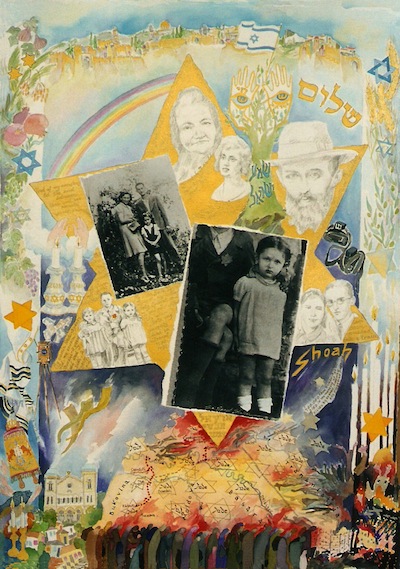Again and again the world does not learn. The ego of dictators and high-ranking politicians is inflated, bordering on insanity. There are many conflicts in the world, but it is Russia’s war on Ukraine that I’m thinking of at this moment.
Who is suffering from all this? The mother with her scared child in her arms, the father who is forced to stay behind and fight, the old and frail, the children in the orphanage who have nowhere to go, the 36-day-old baby boy who does not have yet an identification paper, a name of his own. Who is suffering? The expecting mother who is running, injured, between the ruins of the hospital; the children, scared, hiding in the bomb shelters, hearing explosions and not knowing if they will have a home to return to.
Again and again, people are running in fear, looking for safe shelter. All around them, shelling, sirens, bombardment, hundreds of tanks parading on main city streets, explosions, ruins and distraction.
All this is taking me back decades to another time, the Second World War: Romania, 1940. It triggers memories of my early childhood journey of displacement, fear, cold and hunger. Then 2 years old, my family and I – and thousands of other Jews from northern Romania – were driven out of our homes to the unknown. For one year we were forced to live in a ghetto in a city called Czernowitz (now in Ukraine) in terrible conditions.
After one year, the ghetto was dissolved and we were forced for days to walk by foot in deep mud, carrying bundles of our meagre belongings on our backs toward an area called Transnistria. Long lines of frightened people, old and young, crying babies, the sick and those with disabilities. Those who could not walk were left behind or shot. The Romanian or German soldiers riding on their horses where shouting and beating up anyone who did not comply with their orders.
They forced us to walk from village to village until we arrived in a place called Djurin, where we settled down. There, we lived for four years in terrible condition. My father was taken from us to a work camp. My mother collected dry wood bunches from the nearby forest and exchanged them for food with the Ukrainian women who felt sorry for us. Toward the end of the war, my mother was injured in a bombardment when the Germans were retreating.
I am glad that I was too young to remember most of my fears, but I can’t escape the ripples of horror from those times. They are engraved in my psyche, in my pores. I tremble now when I see the young children on the TV screen with their big, scared eyes. Maybe they are hungry, cold or frightened. I wish I could hug and console them and feed them with my special chicken soup.

For us, there was no place to seek shelter, nobody wanted us, and nobody cared. The world was silent to our plight. We were denied refuge from most countries. We should remember the destiny of the St. Louis ship, which carried Jewish refugees trying to escape the terror of the war in Europe but was not allowed to enter Cuba, the United States or Canada. The ship had to return to Germany, where 254 of the passengers were murdered by the Nazis. Nor should we forget the ship Struma’s disaster – it was torpedoed and sunk with 800 Jewish refugees, who were on their way from Romania to Palestine. We should not forget Canada’s Frederick Blair, who was in charge of the immigration branch at the time, or then-prime minister William Lyon MacKenzie King’s immigration policy “None is too many,” just when the Jews of Europe were in despair and looking for shelter.
War is evil, then and now and always. Still, I can’t stop being amazed at the differences I see in the world’s reaction of kindness and compassion toward the Ukrainian refugees these days. Moldova, one of the poorest countries in Europe, Poland, Romania and Germany – all have opened their gates with outstretched arms to help the tired mothers, scared children, orphans, the sick and the old. The world’s reaction shows me that the world is changing – including Canada – and that gives me hope.
Israel is bringing in thousands of people from the war zone. They give humanitarian assistance wherever needed. Synagogues in Ukraine, and Jewish congregations from around the world, help bring people to safety, like the Odessa orphanage children that were taken to Berlin.
Still, millions of people suffer because of politics and a madman who wants to expand his territory and his pockets.
I wish that we had in our camps some support, food and warm clothing, medical attention and safety. For us, the world was blind. Only the ones who survived live to tell.
We child survivors are now home for one another.
Sidi Schaffer was born in northern Romania. In 1940, she and her family were put into a ghetto in Czernowitz and, one year later, they were driven toward a concentration camp named Djurin, in northwestern Ukraine. There, in terrible conditions, they survived for four years. In 1945, they returned to Romania and, in 1959, they immigrated to Israel, where she received her degree in art education. In 1975, with husband David and their three sons, she came to Canada. In Edmonton, she went back to her studies and graduated with a bachelor of fine arts from the University of Alberta. In 1998, she and her family settled in Vancouver. Schaffer is a proud member of the Child Survivor Group of Vancouver.
